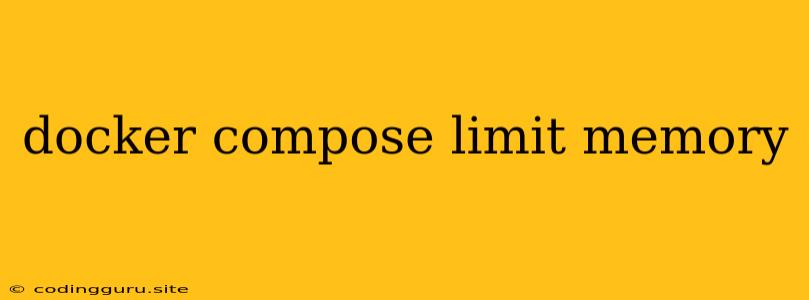Docker Compose: Limiting Container Memory
Docker Compose is a powerful tool for orchestrating multi-container Docker applications. One of its key features is the ability to define and manage resources for each container, including memory limitations. This is crucial for ensuring that your application runs smoothly and efficiently, preventing resource contention and ensuring stability.
Why Limit Container Memory?
In a multi-container environment, it's common for containers to compete for resources like CPU and memory. If a container consumes excessive memory, it can impact the performance of other containers and potentially lead to crashes or instability. Limiting memory per container ensures that each container has a dedicated resource allocation and prevents any single container from monopolizing available resources.
How to Limit Memory Using Docker Compose
You can limit memory consumption for containers using the mem_limit option within your Docker Compose YAML file. This option specifies the maximum amount of memory the container can use.
Example
version: "3.7"
services:
web:
image: nginx:latest
mem_limit: 512m # Limit web container to 512 MB of memory
db:
image: mysql:latest
mem_limit: 1024m # Limit db container to 1 GB of memory
Important Considerations
- Memory Units: The
mem_limitvalue is specified in bytes. You can use suffixes likemfor megabytes,gfor gigabytes, andkfor kilobytes. - Memory Swapping: Limiting memory doesn't prevent the container from using swap space if it exceeds its memory limit. You can further control swapping by using the
mem_swappinessoption. - Container Restart Policy: If a container exceeds its memory limit, Docker will usually kill the container. Ensure your container restart policy is set appropriately to handle such situations.
- Monitoring: It's essential to monitor the memory usage of your containers regularly. Tools like
docker statscan be helpful for tracking memory consumption.
Tips for Optimizing Memory Usage
- Optimize Images: Use minimal base images and only include necessary libraries and dependencies.
- Cache Data: Utilize caching mechanisms to reduce memory usage by storing frequently accessed data.
- Code Optimization: Refactor code to minimize memory consumption and avoid memory leaks.
- Runtime Tuning: Adjust JVM or Node.js settings to optimize memory allocation and garbage collection.
Troubleshooting Memory Issues
If you encounter memory issues with your containers, consider the following steps:
- Analyze Memory Usage: Use
docker statsor other monitoring tools to identify the container with high memory usage. - Inspect Container Logs: Analyze container logs for error messages or clues about the cause of memory issues.
- Debug Code: If the issue is related to your application code, debug it to identify memory leaks or inefficient memory usage.
- Adjust Memory Limits: Experiment with different memory limits to find the optimal balance between performance and resource usage.
Conclusion
Limiting memory per container using Docker Compose is crucial for maintaining a stable and efficient multi-container environment. By carefully defining memory limits and optimizing container resource usage, you can ensure that your applications run smoothly and avoid performance bottlenecks. Remember to monitor your containers regularly to identify potential memory issues and adjust resources as needed.
